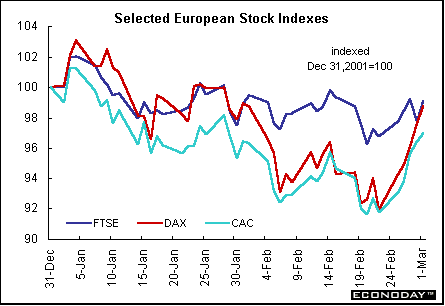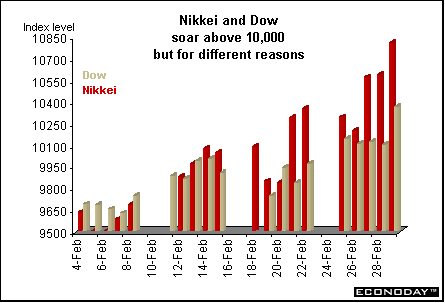 |

Britain and Europe
The Paris CAC and Frankfurt DAX continue to be more volatile than the London FTSE 100. The FTSE has managed to perform better so far this year and has risen especially in the last couple of weeks to pull almost even with the beginning of the year. At their low points only a couple of weeks ago, the CAC and DAX were down about 8 percent. But by March 1, the DAX was down 1.2 percent while the CAC was still 3 percent shy of its December 31, 2001 close. At their lows Enronitis haunted all three indexes, but as the fears recede somewhat investors have chosen to focus on improving economic statistics.

Asia
New restrictions on short selling and an influx of domestic pension money helped push the Nikkei 225 to a two-month high Friday. The index was 4.4 percent higher on the week. National pension funds stepped up their investments ahead of fiscal year-end, when many Japanese institutions may be marking their equity and loan portfolios to market for the very first time, bringing them in line with global accounting procedures. This may prompt many Japanese institutions to be declared either insolvent or nearly insolvent - a huge problem for Japan. With the Nikkei trading over 10,000, Japanese equity holdings will likely show a 50 percent loss from purchase price (20- year Nikkei average at roughly 22,000) to market price (Nikkei close Monday 10,296.47). There is also the problem of non-performing loans, which have been exacerbated by the recent wave of new bankruptcies. Changes on April 1 in deposit insurance (banks will only insure deposits up to Y10 million) are expected to prompt some investors to keep their money abroad even though the insurance coverage may not be dramatically different than that offered by foreign banks.

Both the Dow Jones Industrial Average (DJIA) and the Nikkei have managed to make their way back over the 10,000 point mark recently. But analysts say the Nikkei is making only virtual gains, while the Dow gains are more on fundamentals such as the turnaround by the manufacturing sector, which is pointing to a U.S. rebound. Japanese equities, on the other hand, were up on the week mostly because of a new regulatory prohibition by the government's Financial Services Agency (FSA). The move, designed to curb short selling abuses by large Japanese brokerages, is forcing many to square positions and purchase stocks, boosting the Nikkei in return. Most analysts dismiss the Nikkei's sharp rise over the last week as "smoke and mirrors" designed by Japanese officials to boost balance sheets ahead of fiscal year end.


Last Week's Highlights • Global Stock Market Indexes • Recap of Global Markets • Currencies • Indicator Scoreboard

The Bottom Line • Looking Ahead
|
 |